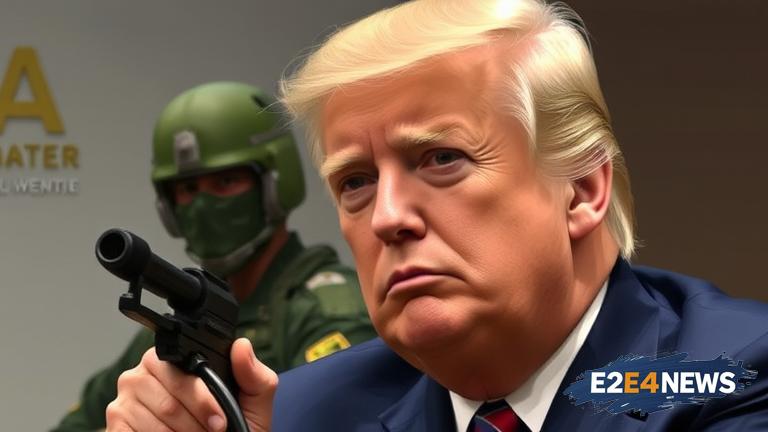The recent proposal by former President Donald Trump to deploy the US military against Mexican cartels has sparked a intense debate about the effectiveness and potential consequences of such a move. Trump’s suggestion has been met with both support and criticism, with some arguing that it is necessary to combat the growing threat of organized crime, while others claim that it would be an overreach of military power and potentially lead to further destabilization in the region. The Mexican cartels have been a major source of concern for both the US and Mexican governments, with their involvement in drug trafficking, human smuggling, and other illicit activities. The cartels have also been responsible for a significant amount of violence and bloodshed in Mexico, with many innocent civilians caught in the crossfire. Trump’s proposal has been seen as a way to address this issue, but it has also raised concerns about the potential for military intervention to exacerbate the problem. Some have argued that the use of military force would only serve to drive the cartels further underground, making them more difficult to track and apprehend. Others have pointed out that the US military is not equipped to deal with the complex and nuanced nature of organized crime, and that a more effective approach would be to address the root causes of the problem, such as poverty and lack of economic opportunities. The Mexican government has also expressed concerns about the proposal, with some officials arguing that it would be a violation of Mexico’s sovereignty and could potentially damage relations between the two countries. Despite these concerns, Trump’s proposal has gained some support, particularly among those who feel that the US needs to take a more aggressive approach to combating organized crime. However, others have argued that the proposal is nothing more than a political stunt, designed to appeal to Trump’s base and distract from other issues. The debate over Trump’s proposal has highlighted the complex and often contentious nature of US-Mexico relations, with both countries struggling to find effective solutions to the shared problem of organized crime. The issue has also sparked a wider discussion about the role of the military in combating crime, with some arguing that it is a necessary tool in the fight against terrorism and organized crime, while others claim that it is a dangerous overreach of military power. As the debate continues, it remains to be seen whether Trump’s proposal will gain traction, or if it will ultimately be rejected as a misguided and potentially counterproductive approach to addressing the complex issue of organized crime. The US and Mexican governments will need to work together to find effective solutions to this problem, and to address the root causes of organized crime, rather than simply relying on military force. This will require a nuanced and multifaceted approach, one that takes into account the complex social, economic, and political factors that contribute to the problem. It will also require a willingness to listen to and work with local communities, who are often the most affected by the violence and instability caused by organized crime. Ultimately, the goal should be to create a safer and more stable region, where citizens can live without fear of violence and intimidation. This will require a sustained and collaborative effort, one that involves not just the US and Mexican governments, but also local communities, civil society organizations, and other stakeholders. By working together, it is possible to create a more just and equitable society, one where the rule of law is respected and the rights of all citizens are protected. The proposal has also raised questions about the potential consequences of using military force against the cartels, including the potential for civilian casualties and the impact on the local economy. Additionally, there are concerns about the potential for the cartels to adapt and evolve in response to military pressure, potentially leading to even more violence and instability. The use of military force could also have unintended consequences, such as pushing the cartels to form alliances with other criminal organizations, or driving them to engage in even more brutal and violent tactics. Furthermore, the proposal has sparked concerns about the potential for the US to become embroiled in a long and costly conflict, one that could distract from other pressing national security issues and drain resources away from more effective and sustainable solutions. The debate over Trump’s proposal has also highlighted the need for a more nuanced and informed discussion about the nature of organized crime and the most effective ways to combat it. This includes recognizing the complex social and economic factors that contribute to the problem, as well as the need for a sustained and collaborative effort to address these underlying issues. By taking a more comprehensive and multifaceted approach, it is possible to create a safer and more stable region, one where citizens can live without fear of violence and intimidation. The proposal has also sparked a wider discussion about the role of the US in the region, and the potential consequences of military intervention. Some have argued that the US has a responsibility to act, given the significant impact of organized crime on US citizens and communities. Others have argued that the US should exercise caution, given the potential for military intervention to exacerbate the problem and create even more instability. Ultimately, the decision to use military force against the cartels will depend on a careful consideration of the potential benefits and risks, as well as a nuanced understanding of the complex social, economic, and political factors that contribute to the problem.
